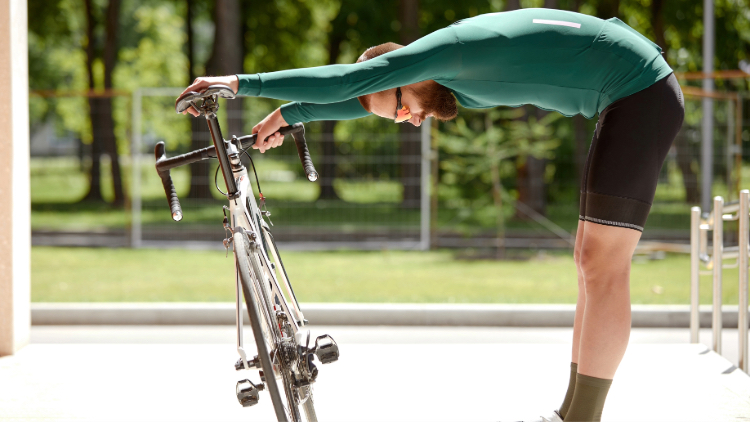Welcome



Imagine a daily activity that not only stirs your spirit but also revitalizes your body—welcome to the world of cycling! Every pedal you take can lead to a healthier, happier you. From boosting your cardiovascular health to enhancing mental well-being, cycling every day transforms your routine into an engaging journey towards wellness.
In this article, we’ll explore ten remarkable health benefits that come from hopping on your bike regularly. Whether you’re a seasoned cyclist or a beginner, discover how commitment to this simple yet effective exercise can significantly improve your life. So, gear up and get ready to unveil the extraordinary advantages awaiting you with daily cycling!
Cycling every day is more than just a physical activity. The rhythmic motion of pedaling not only strengthens your muscles but also promotes cardiovascular health, weight loss, mental clarity, and overall well-being. Incorporating cycling into your daily routine can be transformative, providing a holistic approach to fitness that isn't limited by age or fitness level. It is a versatile exercise that accommodates different intensities, making it accessible for beginners and challenging for seasoned athletes alike.
One of the most compelling reasons to make daily cycling a habit is its low-impact nature. Unlike running or other high-impact sports, cycling is gentle on your joints while still providing an excellent cardiovascular workout. This exercise suits people of all ages, even those healing from injuries or managing long-term health issues. The ability to customize your ride to match your fitness level and goals ensures that you can gradually build strength and endurance without the risk of overexertion.
Moreover, cycling daily encourages you to spend more time outdoors, which has added health benefits. Fresh air and sunshine contribute to your physical and mental well-being. The social aspect of cycling, whether you join a club or ride with friends, enhances your social life and provides a support network that can motivate you to stay committed to this healthy habit. In essence, daily cycling is a comprehensive approach to improving your health that goes beyond the physical benefits.
Regular cycling is a superb way to maintain and improve your cardiovascular health. When you pedal, you engage your heart and lungs, increasing the efficiency with which oxygen is transported throughout your body. This enhanced cardiovascular function helps reduce the risk of heart disease, hypertension, and stroke. Cycling also helps lower your resting heart rate, indicating a more efficient heart function and better overall cardiovascular fitness.

Engaging in daily cycling can lead to significant improvements in your blood pressure and cholesterol levels. As you ride, your blood vessels expand and contract, helping to keep them flexible and free from plaque buildup. This process improves blood flow and reduces the likelihood of blockages that can lead to heart attacks or strokes. Additionally, the aerobic nature of cycling boosts your HDL (good) cholesterol while lowering LDL (bad) cholesterol, creating a healthier lipid profile.
Moreover, cycling stimulates the production of nitric oxide in your arteries, enhancing blood flow and reducing blood pressure. This effect, combined with the calorie-burning aspect of cycling, contributes to weight loss and decreased risk of obesity-related cardiovascular issues. By committing to daily cycling, you are taking proactive steps towards maintaining a healthy heart and robust cardiovascular system.
Cycling is an excellent exercise for burning calories and shedding excess weight. The calories you burn while cycling vary based on factors like your weight, speed, and the terrain. On average, though, cycling can burn anywhere from 400 to 1000 calories per hour. This makes it a good method to help create the calorie deficit needed for weight loss.
One of the key advantages of using cycling for weight loss is its adaptability. You can tailor your rides to match your fitness level and weight loss goals. Whether you choose high-intensity interval training (HIIT) with brief bursts of hard effort followed by rest, or longer, steady rides, cycling adds variety to your workout routine. Both methods are effective for burning calories and improving metabolic rate.
In addition to burning calories, cycling helps build lean muscle mass, particularly in the lower body. Muscle burns more calories at rest than fat, so building muscle through regular cycling can raise your resting metabolic rate. This leads to more efficient calorie burning, even when you’re not cycling, making it easier to maintain a healthy weight in the long term.

Cycling is a fantastic way to strengthen and tone your legs and core muscles. The primary muscles engaged during cycling include the quadriceps, hamstrings, calves, and glutes. As you pedal, these muscles work together to propel you forward, building strength and endurance over time. Regular cycling helps to sculpt and define these muscle groups, giving you stronger, more toned legs.
Besides working your lower body, cycling also activates your core muscles, such as the abdominals and lower back. Maintaining stability on the bike requires core strength, which helps to improve balance and posture. A strong core is essential for overall fitness, as it supports your spine and reduces the risk of injuries. By incorporating daily cycling into your routine, you can develop a more robust and resilient core.
Furthermore, cycling can be complemented with off-bike exercises to enhance muscle strength and flexibility. Incorporating strength training exercises such as squats, lunges, and planks can further enhance the benefits of cycling, leading to a well-rounded fitness regimen. The combination of cycling and strength training promotes muscle growth, improves performance, and reduces the likelihood of muscular imbalances and injuries.
The mental health benefits of daily cycling are profound and multifaceted. Cycling has been shown to reduce symptoms of depression and anxiety. The rhythmic motion of pedaling, combined with the focus required to navigate your route, can create a meditative effect, helping to clear your mind and reduce stress levels.
Spending time outdoors while cycling exposes you to natural sunlight, which is a vital source of Vitamin D. This nutrient plays a crucial role in regulating mood and preventing depression. Additionally, the change of scenery and fresh air can provide a refreshing break from the stresses of daily life, allowing you to return with a clearer mind and a more positive outlook.
Cycling also offers a sense of accomplishment and boosts self-esteem. Setting and achieving cycling goals, whether it’s completing a certain distance or improving your speed, can provide a significant confidence boost. The physical improvements you notice, such as increased stamina and muscle tone, further contribute to a positive self-image. By incorporating cycling into your daily routine, you can foster a healthier, more resilient mental state.
One of the standout benefits of cycling is its low-impact nature, which makes it an ideal exercise for enhancing joint mobility without causing undue stress. Unlike high-impact activities like running, which can put significant strain on the knees and hips, cycling allows for smooth, controlled movements that support joint health. This makes it particularly beneficial for individuals with arthritis or those recovering from joint injuries.

When you cycle, the repetitive motion of pedaling helps to lubricate the joints, reducing stiffness and improving range of motion. The circular motion also promotes the production of synovial fluid, which is essential for maintaining healthy cartilage. This fluid acts as a lubricant and shock absorber, protecting the joints and enhancing their longevity. Regular, gentle cycling can thus help keep your joints flexible and functional.
Cycling also builds the muscles around your joints, improving support and stability. Stronger muscles can ease pressure on the joints, helping to reduce pain and discomfort. This is especially important for individuals with chronic joint conditions, as it can lead to improved mobility and a higher quality of life. By incorporating daily cycling into your routine, you can maintain joint health and prevent the progression of degenerative joint diseases.
Building endurance and stamina is one of the most significant benefits of daily cycling. As you regularly engage in this aerobic exercise, your body adapts by becoming more efficient at using oxygen, which enhances your overall endurance. This increased efficiency allows you to ride longer distances and tackle more challenging terrains without feeling as fatigued.
Cycling consistently trains your cardiovascular system to handle prolonged physical activity. Your heart becomes stronger, pumping blood more effectively, and your lungs become more capable of supplying oxygen to your muscles. This improved cardiovascular function translates to better performance in other physical activities as well, making you more resilient and capable of handling everyday tasks with ease.
Furthermore, the progressive nature of cycling allows you to continually challenge yourself and set new goals. Whether you aim to increase your speed, ride longer distances, or tackle hillier routes, each achievement builds upon the last, fostering a sense of accomplishment and motivation. The incremental improvements in your endurance and stamina can have a significant impact on your overall fitness and well-being, encouraging you to maintain an active lifestyle.
Cycling is an excellent exercise for improving balance and coordination. Maintaining stability on a bike requires the activation of various muscle groups, particularly in the core and lower body. As you ride, your body must constantly make small adjustments to keep you upright and steady, enhancing your proprioception, or the sense of your body’s position in space.
Improved balance and coordination are crucial for overall physical health and can help prevent falls and injuries, especially as you age. The dynamic movements involved in cycling, such as steering, shifting your weight, and navigating different terrains, challenge your body’s balance systems. Over time, this leads to better reflexes and a heightened ability to stay balanced in various situations.
Additionally, cycling can improve coordination between different parts of your body. The synchronization of your legs pedaling, your hands steering, and your eyes scanning the environment requires a high level of coordination. This enhanced coordination can benefit other areas of your life, from sports performance to daily activities that require precise movements. By incorporating cycling into your routine, you can develop better balance and coordination, contributing to overall physical stability and agility.
Cycling also strengthens the muscles around your joints, which improves support and stability. Having stronger muscles helps reduce pressure on the joints, easing pain and discomfort. Cycling increases the production of serotonin, a neurotransmitter that promotes relaxation and helps you fall asleep more easily. This improved sleep quality translates to better overall health and well-being.
In addition to better sleep, cycling can also boost your energy levels. The increased oxygen flow and improved cardiovascular function resulting from regular cycling enhance your body’s ability to produce and use energy efficiently. This means that you will feel more energized and alert throughout the day, with less fatigue and more vitality to tackle your daily tasks.
Moreover, the mental clarity and reduced stress associated with cycling contribute to better sleep and higher energy levels. By clearing your mind and reducing anxiety, cycling helps you to unwind and prepare for restful sleep. The combination of physical exertion and mental relaxation creates a balanced state that supports rejuvenating rest and sustained energy. Incorporating daily cycling into your routine can lead to a more restful night’s sleep and a more energized day.

Cycling is not only beneficial for your health but also for the environment. As a mode of transportation, cycling produces zero emissions, making it a sustainable and eco-friendly alternative to driving. Opting to cycle instead of driving for short trips lowers your carbon footprint and helps keep the air cleaner. This environmental impact makes your daily rides even more rewarding.
In addition to being eco-friendly, cycling is an enjoyable and fun way to stay fit. The sense of freedom and adventure that comes with exploring new routes and discovering scenic trails can make exercise feel less like a chore and more like a pleasurable activity. Whether you’re cycling through a bustling city or a peaceful countryside, the experience can be invigorating and refreshing.
Furthermore, cycling can be a social activity, allowing you to connect with others who share your passion for riding. Joining a cycling club or participating in group rides can provide a sense of community and camaraderie, making your fitness journey more enjoyable and motivating. The combination of environmental consciousness, physical health benefits, and social engagement makes daily cycling a fulfilling and multifaceted activity that enhances your quality of life.
Cycling every day demands energy, strength, and proper recovery. While the activity itself builds endurance and burns fat, your body also needs the right nutrients to perform well and heal afterward. This is where smart nutrition comes in. Eating balanced meals is important, but adding high-quality supplements can help fill the gaps, especially when you're pushing your limits.
Revolution Nutrition offers a range of supplements that are great for active people, including cyclists. Our protein powders help with muscle recovery, our BCAAs support muscle maintenance during long or intense rides, and our pre-workout formulas can give you an energy boost when you need it most. If you're serious about building strength, recovering faster, or just feeling better after your rides, using quality supplements like these can make a difference. Adding us to your routine can support your cycling goals and help you get more out of every ride.
The benefits of daily cycling are vast and varied, offering improvements in cardiovascular health, weight management, muscle strength, mental health, joint mobility, endurance, balance, sleep quality, energy levels, and environmental sustainability. By committing to this simple yet effective exercise, you can transform your routine and embark on a journey towards a healthier, happier you. So, gear up and start pedaling your way to a better life!